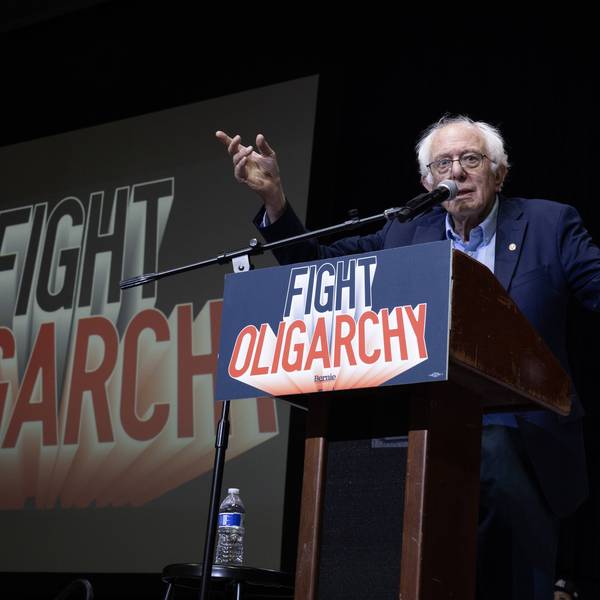
A protester is seen during a climate change demonstration holding a placard that says, 'There Is No Planet B.' (Photo by Ronen Tivony/SOPA Images/LightRocket via Getty Images)
'If Environment Were a Bank,' Says Bernie Sanders, 'It Would Have Been Saved Already'
Sanders has introduced a $16.3 trillion Green New Deal plan to avert climate catastrophe and create 20 million jobs in the process
The U.S. government took decisive action and spent trillions of dollars to bail out Wall Street banks in the midst of the 2008 financial crisis, but it has refused to do the same to rescue the planet from climate catastrophe--a fact Sen. Bernie Sanders highlighted in a pithy tweet on Friday.
"If the environment were a bank," wrote the 2020 Democratic presidential candidate, "it would have been saved already."
Estimates of the size of the Wall Street bailout vary widely. When Federal Reserve loans are included in the bailout figures, some estimates put the total number as high as $29 trillion.
Sanders' Green New Deal plan, which the senator released last week, would aim to invest $16.3 trillion in a decade-long effort to transition the U.S. economy to 100 percent renewable energy and create 20 million well-paying union jobs.
According to the Sanders campaign, the proposal would "pay for itself over 15 years" by hiking taxes on the rich and large corporations, slashing military spending, and boosting economic activity with massive public investment.
On top of the human costs of climate inaction, the economic toll would be "unacceptable," the Sanders campaign notes in its Green New Deal platform.
"Economists estimate that if we do not take action, we will lose $34.5 trillion in economic activity by the end of the century," the platform states. "And the benefits are enormous: by taking bold and decisive action, we will save $2.9 trillion over 10 years, $21 trillion over 30 years, and $70.4 trillion over 80 years."
An Urgent Message From Our Co-Founder
Dear Common Dreams reader, The U.S. is on a fast track to authoritarianism like nothing I've ever seen. Meanwhile, corporate news outlets are utterly capitulating to Trump, twisting their coverage to avoid drawing his ire while lining up to stuff cash in his pockets. That's why I believe that Common Dreams is doing the best and most consequential reporting that we've ever done. Our small but mighty team is a progressive reporting powerhouse, covering the news every day that the corporate media never will. Our mission has always been simple: To inform. To inspire. And to ignite change for the common good. Now here's the key piece that I want all our readers to understand: None of this would be possible without your financial support. That's not just some fundraising cliche. It's the absolute and literal truth. We don't accept corporate advertising and never will. We don't have a paywall because we don't think people should be blocked from critical news based on their ability to pay. Everything we do is funded by the donations of readers like you. Will you donate now to help power the nonprofit, independent reporting of Common Dreams? Thank you for being a vital member of our community. Together, we can keep independent journalism alive when it’s needed most. - Craig Brown, Co-founder |
The U.S. government took decisive action and spent trillions of dollars to bail out Wall Street banks in the midst of the 2008 financial crisis, but it has refused to do the same to rescue the planet from climate catastrophe--a fact Sen. Bernie Sanders highlighted in a pithy tweet on Friday.
"If the environment were a bank," wrote the 2020 Democratic presidential candidate, "it would have been saved already."
Estimates of the size of the Wall Street bailout vary widely. When Federal Reserve loans are included in the bailout figures, some estimates put the total number as high as $29 trillion.
Sanders' Green New Deal plan, which the senator released last week, would aim to invest $16.3 trillion in a decade-long effort to transition the U.S. economy to 100 percent renewable energy and create 20 million well-paying union jobs.
According to the Sanders campaign, the proposal would "pay for itself over 15 years" by hiking taxes on the rich and large corporations, slashing military spending, and boosting economic activity with massive public investment.
On top of the human costs of climate inaction, the economic toll would be "unacceptable," the Sanders campaign notes in its Green New Deal platform.
"Economists estimate that if we do not take action, we will lose $34.5 trillion in economic activity by the end of the century," the platform states. "And the benefits are enormous: by taking bold and decisive action, we will save $2.9 trillion over 10 years, $21 trillion over 30 years, and $70.4 trillion over 80 years."
The U.S. government took decisive action and spent trillions of dollars to bail out Wall Street banks in the midst of the 2008 financial crisis, but it has refused to do the same to rescue the planet from climate catastrophe--a fact Sen. Bernie Sanders highlighted in a pithy tweet on Friday.
"If the environment were a bank," wrote the 2020 Democratic presidential candidate, "it would have been saved already."
Estimates of the size of the Wall Street bailout vary widely. When Federal Reserve loans are included in the bailout figures, some estimates put the total number as high as $29 trillion.
Sanders' Green New Deal plan, which the senator released last week, would aim to invest $16.3 trillion in a decade-long effort to transition the U.S. economy to 100 percent renewable energy and create 20 million well-paying union jobs.
According to the Sanders campaign, the proposal would "pay for itself over 15 years" by hiking taxes on the rich and large corporations, slashing military spending, and boosting economic activity with massive public investment.
On top of the human costs of climate inaction, the economic toll would be "unacceptable," the Sanders campaign notes in its Green New Deal platform.
"Economists estimate that if we do not take action, we will lose $34.5 trillion in economic activity by the end of the century," the platform states. "And the benefits are enormous: by taking bold and decisive action, we will save $2.9 trillion over 10 years, $21 trillion over 30 years, and $70.4 trillion over 80 years."

